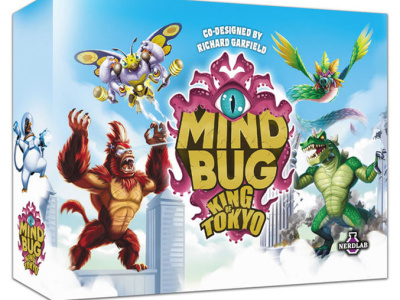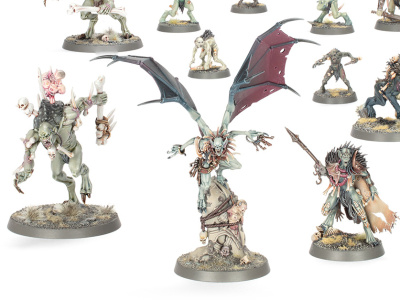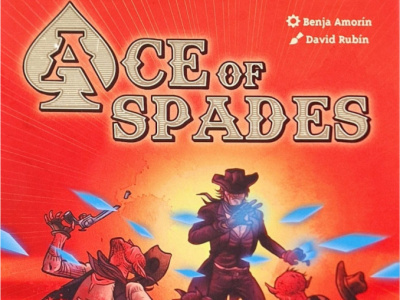We interviewed the two top officers of WizKids, president Lax Chandra and executive vice president Joe Hauck, to talk about their move to exclusive distribution for the hobby channel (see 'WizKids Goes Exclusive'). In Part 2, we discussed the industry context and effects of the exclusivity deal, the potential impact on inventory levels of WizKids product, WizKids' plans for returnability, and its staff levels for retailer service. In Part 1 (see 'Interview with Chandra Lax and Joe Hauck, Part 1'), we talked about the impact on access to product for Internet discounters, the company's expectations for the impact on its sales over time, and possible changes in how WizKids interacts with retailers.
Talk a little about what this will do to inventory levels for the hobby.
Hauck: Two things are going to get better as a result of this. One is more accurate information on what's going on, and we're going to have better information on how to forecast our products. We had a series of products that came out this fall that were allocated throughout the industry, and while we are a collectable game company and we expect that our products will be collectible and in demand, and we won't satisfy 100% of demand, we don't want to be satisfying 50% of demand, we want to be able to satisfy 95% of demand. We want there to be something special about WizKids product. So we'll have better visibility to allow us to get closer to that goal.
The flip side of that is that under the current structure there's a lot of activity that goes on at the notable stores, the stores that everyone knows are big stores and are big players in the industry. They may order product from a number of different distributors, and a lot of the time they get it. That leaves a lot of the smaller stores that are still trying to grow or don't have the same kind of reputation without the product. We believe that now we will not only be able to satisfy the demand better, we'll also have a better spread of our products across the entire industry and we'll have better penetration as a result. That's what we want.
Any consumer that we get excited about our products, we want to be able to go to their store and get that product. We believe that with this new arrangement, we'll be more successful in doing that.
Chandra: We believe that for those stores that aren't getting the attention because they aren't able to buy a lot of product, it becomes a self-fulfilling prophesy because they can never really get the hot product. We believe very optimistically that we'll be able to spread that product out and stores will be able to get the product they want. That's a huge benefit for us, and it's a huge benefit for those stores.
Will you change the number of people at WizKids that interact with retailers?
Hauck: We haven't announced it publicly yet, but we're in the middle of a reorganization of our entire customer service, approved play, and envoy system management. We're ramping up the number of resources that we have internally to manage those systems, because we think that's a critical function of the company.
There will be some changes in the sense that there will be customer service calls that normally would come into us like 'Where's my shipment,' or 'This thing was missing,' or 'How do I do this' that will be handled by Alliance or Diamond. So that allows us to handle larger issues, philosophical issues, strategic issues, like 'I'm having this issue with the envoy program; how can we make this work better for us?' So in that way we'll be able to handle more customer service volume with retailers than we've been able to do in the past.
Chandra: And the key point is that we do want to be able to increase our customer service resources.
Can you put this in context? What's your perception of the overall health of the hobby channel now vs. a couple of years ago?
Chandra: I'll have Joe talk about a couple of years ago, but I can just tell you that today the industry's doing pretty well. There are a lot of products out in the marketplace that have been doing pretty well of late. I think retailers right now, at least relative to where they were a year ago, are stronger, and I think the industry is stronger.
Hauck: There have been a lot of changes in the industry, and the days of making a product and throwing it out there to see if something sticks are over. Retailers can't afford to just take a flying risk on every product that comes out. They need to see a strategic benefit or understand why it would be exciting to their players or consumers.
The market has already been changing, and has started to adapt to that. The folks that are making products that are keyed in on what people actually want, can articulate what those needs are and why people should want them and can develop the products properly, will ultimately succeed and we're seeing that change.
We did a lot of changes on Supernova after we got here to try and make it more salable, and it was effective. It was the best HeroClix expansion in a long time. So from that perspective, we're going to continue to go through a process where we understand the consumer better, who's buying our product, why do they like it, what are the benefits they think they get out of our product, and make sure that we're hitting on all those things.
They're going to see a rapid expansion of those capabilities over the next year on Heroclix as we get closer to the consumer and closer to the retailer. That's the way the business is going, and as long as manufacturers are being responsible in doing that sort of thing, there's going to be more and more success for the retailers out there and they'll continue to get stronger.
Chandra: Retailers are stronger today, partly because of experience, and partly because there's been consolidation. They're not getting hurt as badly as they used to on inventory choices. We have faith in the retail channel. This deal is based on the fact that we want to get closer to the retailers and that necessitates them being receptive to talking to us and implementing our promotions that we want to execute. We believe they'll be receptive, and they'll see the strength of the promotions we're going to run and the support they're going to get.
You launched HorrorClix returnable, which worked well for you. Will you do more or less returnability as a result of this change?
Chandra: It's unclear. The question becomes, 'Is it better to offer it returnable? or is it better to put more money into the promotion and support of the product at launch? Maybe it's a combination of both. It's something we're still looking at. Ultimately, it's not just about giving retailers an option to return the product, it's also about giving retailers a chance to be successful with the product. And giving them that opportunity is based on what support we're giving them to be successful. There's probably some kind of re-allocation that might need to occur, but we just don't know yet.
Hauck: More importantly, the strategic answer is that we've got to give retailers the right tools to be successful. One tool in the arsenal has been returnability, and that worked very well for us. There are other tools that we can also use. We're going to be looking at a whole variety of things that we can do for them, and we'll certainly be working with







